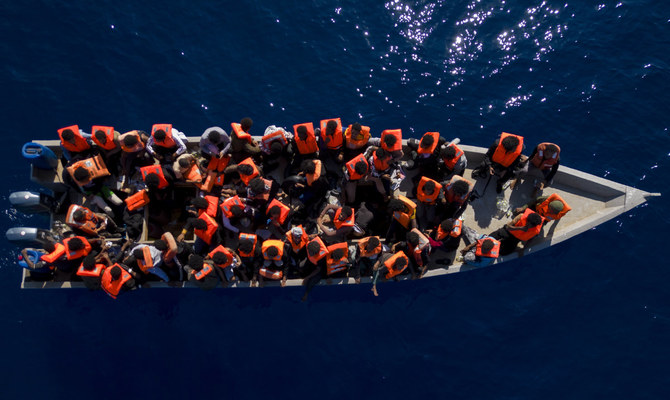Chris Doyle
It is that time of year again, when wealthy Northern Europeans dust off their swimsuits and descend on the warm, sun-drenched beaches of the continent’s Mediterranean shores and the decks of expensive yachts. The warmer months also see an armada of unseaworthy vessels coughing up their motley cargo of “nonpeople,” either on to the shores of an unwelcoming European landmass or, all too often, to the depths of those deep waters. A banner displayed at Thessaloniki port held nothing back: “Tourists, enjoy your cruise in Europe’s biggest migrants cemetery.”
Nothing better typifies the respective worlds of the haves and the have-nots than what the Mediterranean now signifies to different people. To some, it is a summer refuge of family fun and holidays. For others, it is a deadly body of water that separates their hell from an imagined utopia – a Mediterranean roulette of extraordinary dangers for those with little left to live for. Their worlds barely ever connect. The rich do not want anything to spoil their vacations. The desperate can only imagine what they are missing.
The latest boat sinking off the coast of Greece last Wednesday has gently pricked a few European consciences once more, at least for a few days. This disaster has killed at least 78 people, almost certainly far more. The details are harrowing. Challenging questions engulf the Greek authorities, whose narrative is being challenged. They were warned about the vessel. The Greek coastguard was present. Did it try to tether the vessel with a rope and steer it away from Greek waters? This would not be the first time.
But it is not just the Greeks. European powers are complicit in a murderous policy, in which mass drownings are just factored in as an unfortunate consequence of the “fortress Europe” approach. The first quarter of this year saw more fatalities on the Central Mediterranean route than in any year since 2017. Many European states have cut back on search and rescue operations at sea. They enter into shoddy deals with third-party states to pass the buck onto them in an effort to prevent the boats ever leaving. They care little as to how this is done or the horrific conditions of detention these people are then forced to endure. For many, these European states have hands saturated in blood, just like the people smugglers who profit from others’ misery. Safe routes for asylum seekers barely exist. As most refugees believe, if you are a blond-haired and blue-eyed Ukrainian, you get welcomed in Northern Europe. If you are a brown-skinned Muslim or a Black African, you get turned away.
What are the drivers of this? As ever, focusing on one issue is never the full story. In Lebanon, where most people want to leave, it is economic disintegration. For Syrians, who made up a large portion of the passengers caught up in last week’s tragedy, the economic collapse in their country is key, but it is one disaster built on so many others. Afghans are fleeing the repression of Taliban rule. Many of the Syrians, perhaps about 70, came from the south of the country, in and around Deraa. How come? Talking to those on the ground, the picture is complex. The regime is not in full control and it came to understandings with armed opposition groups, meaning the regime leaves certain areas alone. The security situation there is fraught with high levels of violent crime, murders and even assassinations.
This has led to Deraa becoming a magnet for outlaws. As a zone of lawlessness, it is also a center for people smugglers, who work openly there. The regime has been handing out amnesties to young men. Fearing being called into the army in six to 12 months’ time, they head to Deraa having obtained passports from the regime. In other words, the regime knows exactly what is happening; that the aim of these youths is to get to Europe. The smugglers have a series of prices. For a journey all the way to Europe, they charge about $16,000. To get to Libya, from where the refugees are told it might be cheaper to move on, it is about $6,000. It seems the passengers each paid about $4,500 for last week’s doomed journey. With estimates of 400 to 750 passengers on board, the people smugglers must have pocketed anything from $2 million to $4 million. It is a lucrative business.
Another option smugglers offer to families is to pay double the fee when the refugee arrives safely in the target destination. Few can afford that. Another reason Deraa is popular with the smugglers is that many Syrians from this area have, for historic reasons, access to a large number of family members who send funds from the richer Gulf countries to pay for these trips. The smugglers also use a series of well-worn overland routes from the south of Syria to Turkiye. They have deals with Turkish border guards to let them cross the border. One source told me that Turkish border guards shoot a few refugees to show that they are doing something – about two in every hundred, he claimed. Once in Turkiye, they fly to Libya on a Syrian passport, even though there is no stamp in their passports to show they left Syria legally. Turkish officials reportedly turn a blind eye.
The jaw-dropping determination of these refugees fleeing persecution, war and economic crisis means that, as hard as the European powers try, they cannot prevent new and even more dangerous routes being risked. It is the “we have nothing to live for” reality that these refugees face that few European politicians have even started to comprehend from their cocooned world of luxury and safety. Those considering joining this dangerous exodus know that, because Europe is embracing more and more the policies of the far right, it will only become harder to find a way in. The Syrians in Deraa are queuing up to leave, just as others are elsewhere in the south. The summer months and the soul-destroying conditions many millions face may see a bumper year for the people smugglers. With World Refugee Day falling on Tuesday, it is time to remember that refugees and asylum seekers are people; human beings. It is time to start treating them as such. The system is broken, guaranteed to lead to endless deaths. Yes, the people smugglers need stopping, but unless the bottomless wells of desperation are tackled in the conflict zones to the south, the boats will never stop coming, no matter how deadly they are. Until then, the Mediterranean will just be the world’s greatest watery graveyard and bodies will wash ashore at the packed tourist beaches and harbors.
Arab News







